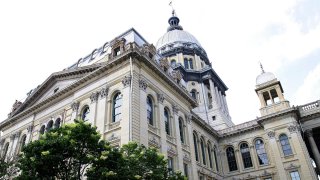
A statute of Stephen A. Douglas, a senator from Illinois whose national reputation in the mid-19th Century was built on the idea that each new U.S. territory should decide on allowing slavery, will be removed from the state Capitol lawn because he personally profited from slavery, officials decided Wednesday.
The board of the Office of the Architect of the Capitol voted unanimously to remove the figure of Douglas, whose career-long nemesis was Abraham Lincoln. A rendering of Pierre Menard, an early Illinois settler, politician and slave owner, also will be removed.
Architect of the Capitol Andrea Aggertt told the board that she did not yet have a cost for removal and storage.
The action came after House Speaker Michael Madigan asked the board to consider removing portraits and statuary of Douglas in and around the Capitol. The Chicago Democrat said he had recently read Lincoln biographer Sidney Blumenthal's account of how Douglas profited from family owned slaves. After George Floyd's death in Minneapolis sparked a nationwide movement to remove Confederate symbols, Madigan decided that references to Douglas should be banished.
Feeling out of the loop? We'll catch you up on the Chicago news you need to know. Sign up for the weekly Chicago Catch-Up newsletter here.
The architect board took no action on a prominent Douglas statue inside the Capitol, or his portrait in the House chamber, voting to take an inventory of all paintings, murals, statues, and other art in the 1876 building.
Douglas was elected to the Senate in 1847. He and prominent Whig Sen. Henry Clay fashioned the Compromise of 1850. It settled the matter of lands ceded in the Mexican War and put Douglas' notion of “popular sovereignty” — that U.S. territories could decide whether to allow slavery — into the political lexicon.
The idea delayed the Civil War and helped him best Lincoln in his 1858 bid for reelection to the Senate, long remembered because of a series of debates between the two, but proved his undoing by the time the two squared off for president in 1860.
Local
The father of Douglas' first wife bequeathed a Mississippi plantation with 100 slaves to his daughter in 1847. Douglas hired a plantation manager while using his 20% share of the income to fund his campaigns, according to Blumenthal.
Menard, who became a successful fur trader in southwestern Illinois nearly 30 years before statehood and was the state’s first lieutenant governor, owned slaves as late as 1830, records show.
The architect board also voted to seek a rule change that would allow Capitol lawn commemorations of people without direct ties to Illinois. It's the reason a statue of Martin Luther King Jr. is on the lawn of the nearby Illinois State Library. The board would like to see King memorialized more prominently.
Douglas, whose grave in Chicago lies beneath a 96-foot granite monument, has fallen out of favor elsewhere. The Chicago Park District in July rededicated a park for Frederick Douglass, the Black scholar and abolitionist. A member of the Springfield Park Board is seeking a similar change in the capital city.
___
Follow Political Writer John O’Connor at https://twitter.com/apoconnor



